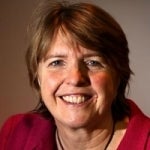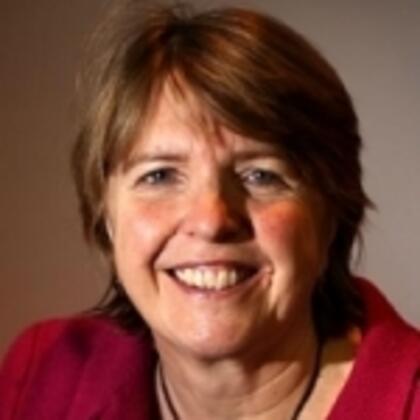Women's Careers: From Oxfam to a Cambridge College
Share
- Details
- Transcript
- Audio
- Downloads
- Extra Reading
Dame Barbara, President of Murray Edwards College and Former Chief Executive of Oxfam, will call on her experience at Oxfam and Cambridge to discuss women's careers and current thinking on how women can succeed and 'get to the top'.
This is the 2015 Gresham Special Lecture.
Download Transcript
Women’s Careers:
From Oxfam to a Cambridge College
Dame Barbara Stocking DBE
The main part of my talk will focus on my 12 years as CE of Oxfam Great Britain. It will be from my experience of the dilemmas and challenges I found in my role but I hope it will also show something of the working of an organisation like Oxfam. In Oxfam itself a major commitment was to “put poor women’s rights at the heart of all we do”. The reason is that as about 70% of the poorest people of the world are women and girls. You simply can’t be a poverty agency without a gender focus. Some of what women experience in developing countries is extreme but we shouldn’t be complacent about the developed world which still has a long way to go. That is what drew me back to my old Cambridge College: Murray Edwards (New Hall as it was then). And in the last part of my talk I want to say a bit more about what we are trying to do to achieve gender equality through the development of today’s exceptional young women.
I want to tell you more about some of my dilemmas as CE:
- Speaking out or staying in the country is a choice in some of the most tragic places in the world. I will describe my experiences of Sudan, where we were eventually thrown out (along with 14 other agencies) in 2009 when the President was indicted by the International Council Court.
- Security of staff. Where can we continue to work?
Afghanistan is the example here where ultimately we were directly attacked with an Improvised Explosive Device killing two staff and a community volunteer seemingly because we had allowed men and women to work together.
- The moral position: who do we accept money from and how this is perceived: the case of Iraq and the UK Government.
These dilemmas in humanitarian crises are by far the most extreme but there are debates to be had in development work: for example, the issues about aid versus enterprise.
Equally, there are challenges in campaigning work – when do you try to change policies by persuasion, why and when do you go out in full attack in the media and in public demonstration? The answer depends on whether anyone is listening. The example of access to medicines for HIV/AIDS is a good one. The pharmaceutical industry simply did not, for a long time, understand that their behaviour was seen as unethical by the public. It was only when they recognised that that we could work with them on change.
A different sort of inside/outside dilemma faced us in Uganda in challenging a company about the way it grabbed land and displaced 22,000 people without compensation. The dilemma was that once the communities were in mediation with the companies through the World Bank’s Ombudsperson, no media or other publicity was allowed, meaning that our best case was hidden, but we had to stand with the communities to ensure they did receive compensation.
After 12 wonderful years though at Oxfam, it was time to move on. A bit about my College then:
It was set up in 1954 as the 3rd Cambridge Foundation for women, after women were able to take degrees in 1948. It has stayed a College for women and in fact in my Presidential speech and interview I said I would want it to stay “for women”. For me, we are in another period where it is realised that gender equality has still not been achieved.
I will describe a survey of all our alumnae which we did for our 60th Anniversary last year. 1,000 replied. We asked them what challenges they had found in their careers: the key one at 38% was an unsupportive work environment, higher than combining work and family at 22%, and also similar though all age groups – 31% of 21-30 year olds agree with this. So what did women mean by an unsupportive work environment? This was all from text and what they described was: having to do better than men, stereotyping of what women could do, progress not being based on merit and discrimination and bullying.
This matched the answers we got when we asked what they wanted or didn’t want from employers. Women want to make a difference in the world, they want their voice heard and they want progress based on merit.
We did this survey in partnership with McKinsey (adapting their Women Matters survey) because we want to have a voice about women’s experience in the world but also to hear about what young women of today might need. Our alumnae told us that confidence building skills, leadership development and understanding the importance of networking and mentors, all would have helped. We have used that information to further build our Gateway Programme which runs throughout the year for both undergraduates and graduates. It covers study skills, personal development such as time management, then career options and preparation (CVs, mock interviews and an internship programme of our own). Alumnae were particularly helpful here in describing the range of careers now open to our students. The programme is very successful and we think unique in Oxford and Cambridge.
But what we also focus on is of course women’s experience in their education. We look particularly at how young women learn, for example being less willing (on average) than young men to take risks in their learning and we work on this in supervisions. But we know there is still a long way to go: there are only 20% women students in Maths in Cambridge and they often say how they feel ‘put down’ or ‘not good enough’, also in exams across the subjects, young women do less well and in some subjects this is extreme. For example, last year’s 1st year history results. There clearly is unconscious bias still taking place in teaching and in assessment. So there is plenty for us to do.
But that is of course why I am there. I want to lead a College which is helping our young women to go out into the world with the confidence and skills to achieve their dreams.
© Dame Barbara Stocking, June 2015
This event was on Tue, 02 Jun 2015
Support Gresham
Gresham College has offered an outstanding education to the public free of charge for over 400 years. Today, Gresham plays an important role in fostering a love of learning and a greater understanding of ourselves and the world around us. Your donation will help to widen our reach and to broaden our audience, allowing more people to benefit from a high-quality education from some of the brightest minds.


 Login
Login







